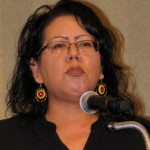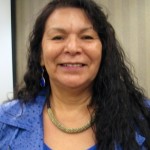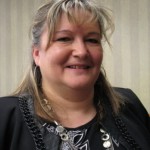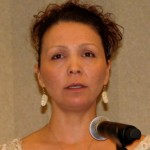Homeward Trust Edmonton recently hosted a half-day Aboriginal Community Update meeting at the inner city’s Coast Plaza Hotel. The session attracted about six dozen community members, various stakeholder groups, service providers, front line workers, funding groups and policy makers who focus on urban Aboriginal and/or homeless issues.
Elder Ted Quinney offered the opening prayer; Homeward Trust Edmonton CEO Susan McGee opened the meeting with greetings and welcoming comments. Together with the organization’s Aboriginal Relation Director, Dave Ward, and Planning and Research Director, Giri Puligandia, McGee brought the gathering up-to-date on Homeward Trust’s ten year plans to end homelessness through a coordinated data-driven system of housing and supports services.
 Bent Arrow Traditional Healing Society Executive Director Cheryl Whiskeyjack |
 Creating Hope Society of Alberta Executive Director Bernadette Iahtail |
 Institute for the Advancement of Aboriginal Women CEO Rachelle Venne |
 Janice Shirt from the Bent Arrow Traditional Healing Society |
Examples of programs and initiatives currently underway and addressing urban Aboriginal homeless needs highlighted the mid-morning session, with comments from Janice Shirt and Cheryl Whiskeyjack (Bent Arrow Traditional Healing Society), Rachelle Venne (Institute for the Advancement of Aboriginal Women) and All Saints Anglican Cathedral Reverend Travis Enright, (Truth and Reconciliation Commission’s March 27-30 Alberta National Event).
Shirt spoke about the importance of working together, sharing ideas, information, results and resources. She offered insight into the programs offered through the Bent Arrow Society and the organization’s Nikihk Housing First Program. She delved into the importance of Aboriginal holistic healing and the significant difference it makes when Aboriginal peoples, institutions and organizations are consulted and involved in healing practices. She also noted that programs and healing initiatives that incorporate such things as “life skills initiatives, home management, opportunities for educational and spiritual growth,” and an atmosphere that offers clients an opportunity to regain their physical, mental and emotional well being, make significant differences in an individual’s ability to overcame despair.
The principle of the Society’s Housing First initiative “is that every person has the right to a safe and secure home.” The Bent Arrow Society goal is to work in partnership with Homeward Trust to open doors and build hope for thousands of Edmontonians, ultimately realizing the Society’s goals of ending homelessness. The initiative is designed to “assist Aboriginal individuals and families in securing safe, affordable, appropriate, and permanent housing, and to develop a plan that will identify challenges and strengths, provide resources and set goals.”
Bent Arrow Executive Director Cheryl Whiskeyjack spoke briefly about the organization’s upcoming 20th Anniversary celebration and the recently created New in Town initiative, the first of its kind in Canada. The New in Town team welcomes and supports Aboriginal families and individuals who are new to the capital city. The coordinated service is mobile, cuturally-driven, hands-on and accessible 24-7.
“The program,” explained Whiskeyjack, “points people in the right direction and refers newcomers to services such as education, employment, Elder’s services, housing, culture and more.”
One of the initiatives has seen more than five dozen city police officers participate in a one-day workshop, complete with powerpoint presentations that give them better insight into Aboriginal culture, families and situations.
“It’s only one day and it’s just a start, but we are making progress,” she assured. “Of course. we’d like to see every patrolman come in and participate but this is a new initiative and we are just in the beginning stages.”
The Society’s New in Town project is operated in partnership with Boyle Street Community Services and Boyle Street Aboriginal Services.
Rachelle Venne, CEO of the Institute for the Advancement of Aboriginal Women (IAAW), spoke about the importance of working together in a concerted effort to enhance and increase safety for Aboriginal women.
“Schools and families need to be kept up-to-date and educated,” she stated. “Girls as young as 12 are being lured via
the internet and other social media tools. As a community, we need to focus on what we can do to provide information in every region of the province. To achieve this we need to work together, we need to share our stories, our ideas, our programs, our successes and our failures.”
The IAAW, she noted, has already taken major steps to increase safety and is currently involved in various initiatives with the RCMP, city police, crimestoppers (northern Alberta) and with outreach programs in Fort McMurray, Fort Chipewyan and Grande Prairie and with its involvement in Cross Provincial and National work. The organization, which has spent more than two years meeting and gathering information on various initiatives, also hosts focus groups with women.
In her powerpoint presentation, Venne provided some startling facts and figures including the fact that 32 percent of all incarcerated (federally) women in Canada are Aboriginal and that between 90 and 99 percent of women in provincial jails are Aboriginal. Of all the Aboriginal women in jail, 80 percent are there for poverty-related crimes and 70 percent have children. More than 72 percent of these women did not have enough money to meet their basic needs when they were arrested. Another disturbing fact is that Aboriginal children make up 68 percent of kids in care.
Canada’s communities and governments, noted Venne, “support immigrants and foreign mishaps but they fall far short when it comes to dealing with the conditions Aboriginal people are facing every day in Canada.”
The latter part of the Aboriginal Community Update gathering looked at research projects supported by the Government of Canada’s Homelessness Partnering Strategy through Homeward Trust.
Will Belcourt’s (Edmonton Aboriginal Seniors Centre) topic dealt with identifying the housing needs of Aboriginal seniors while (University of Alberta faculty members) Rebecca Martell (Dept. Occupational Therapy) and Dr. Rabia Ahmed and Dr. Louanne Keenan (Faculty of Medicine and Dentistry), provided insight into the impact of homelessness and incarceration on the health of women.
Creating Hope Society Executive Director Bernadette Iahtail addressed the housing and support needs of Aboriginal fathers in Edmonton who are involved with child welfare and/or the justice system.
“Too many Aboriginal men involved in child welfare and criminal justice issues are falling through the cracks,” she stated, “and this is an area that needs to be addressed in a timely and meaningful way. There are no men’s shelters; the only haven for these men – if they are forced to leave the home or for one reason or another have no place to stay, is the Herb Jamieson and George Spady Centres.”
These two well known facilities cater primary to the chronic homeless, many of whom are either mentally or physically disabled and continually find themselves in and out of the justice system. The programs and the facilities in the two centres are not equipped with the tools, manpower and program expertise needed to effect positive change.
“The child welfare and justice systems have their rules and regulations and they enforce them,” noted Iahtail. “Children come first; they must be protected and as a result mothers, and more regularly, fathers are removed from the home environment. If they don’t have a place to stay, what happens to them? They fall back into despair; they lose hope and may even end up in a worse position than when they started. Many fall through the cracks and this trend will continue unless something can be done to address their needs. Fathers are further burdened when they are compelled to complete anger management courses or other sessions and workshops that help get to the root of the problems that saw them removed from the home. There is a specific list of things that these fathers must do if they want to return home, if they want to spend time with their children. Some of these programs and courses are lengthy and those who have full time jobs can easily lose them. If that becomes the case, if they have no income it just makes matters worse because you can’t feed and clothe yourself or your family without any income. We desperately need to find solutions; let’s gather our resources and put our heads together – we need to work in unison if we want to achieve positive change.”
Homeward Trust Edmonton is a not for profit organization that uses a community-based approach toward the goal of ending homelessness in Edmonton. The primary role of the organization is to coordinate responses to housing needs by working together with local agencies and all orders of government.
A comprehensive organization, Homeward Trust increases access to housing by funding the development of new units and accessing market units; coordinates the provision of support services; undertakes community planning and research; and raises awareness in the community through events and initiatives that promote ending homelessness in Edmonton
by John Copley


please help me find a friend. I live in Terrace, B.C. I know Rebecca from my years as a counsellor. Past 14 years I have had medical problems and am trying to find my friend. I you know Rebecca Martelle, Edmonton, could you please give her my email and name. Many tks. Benita Chapdelaineb